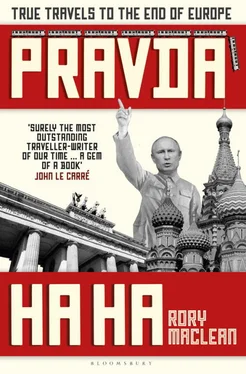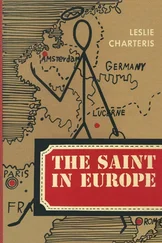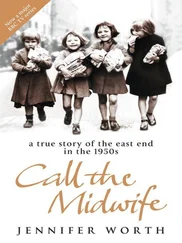Rory MacLean - Pravda Ha Ha - True Travels to the End of Europe
Здесь есть возможность читать онлайн «Rory MacLean - Pravda Ha Ha - True Travels to the End of Europe» весь текст электронной книги совершенно бесплатно (целиком полную версию без сокращений). В некоторых случаях можно слушать аудио, скачать через торрент в формате fb2 и присутствует краткое содержание. Город: London, Год выпуска: 2019, ISBN: 2019, Издательство: Bloomsbury Publishing, Жанр: Путешествия и география, Публицистика, на английском языке. Описание произведения, (предисловие) а так же отзывы посетителей доступны на портале библиотеки ЛибКат.
- Название:Pravda Ha Ha: True Travels to the End of Europe
- Автор:
- Издательство:Bloomsbury Publishing
- Жанр:
- Год:2019
- Город:London
- ISBN:978-1-4088-9652-5
- Рейтинг книги:3 / 5. Голосов: 1
-
Избранное:Добавить в избранное
- Отзывы:
-
Ваша оценка:
- 60
- 1
- 2
- 3
- 4
- 5
Pravda Ha Ha: True Travels to the End of Europe: краткое содержание, описание и аннотация
Предлагаем к чтению аннотацию, описание, краткое содержание или предисловие (зависит от того, что написал сам автор книги «Pravda Ha Ha: True Travels to the End of Europe»). Если вы не нашли необходимую информацию о книге — напишите в комментариях, мы постараемся отыскать её.
Pravda Ha Ha: True Travels to the End of Europe — читать онлайн бесплатно полную книгу (весь текст) целиком
Ниже представлен текст книги, разбитый по страницам. Система сохранения места последней прочитанной страницы, позволяет с удобством читать онлайн бесплатно книгу «Pravda Ha Ha: True Travels to the End of Europe», без необходимости каждый раз заново искать на чём Вы остановились. Поставьте закладку, и сможете в любой момент перейти на страницу, на которой закончили чтение.
Интервал:
Закладка:
‘We persist in regarding ourselves as a Great Power, capable of everything and only temporarily handicapped by economic difficulties,’ Sir Henry Tizard, chief scientific adviser to the Ministry of Defence, had said at the end of the Second World War, the moral victory that today’s self-styled ‘patriots’ have twisted into so many immoral lies. ‘We are not a Great Power and never will be again. We are a great nation, but if we continue to behave like a Great Power we shall soon cease to be a great nation.’
Nearby a robin moved through a thicket of ash. A woodpecker’s laughing call echoed from a far copse. Overhead the sky filled with skylarks. The British will sort themselves out, I know, but it will take a generation. England will survive, but not in a form that any of us have known. I walked back to the car, broken glass crunching beneath my feet.
36
Fog in the Channel
Lunch was twenty minutes. That was all she could spare and she made sure that I knew it. Fennel risotto with pine nuts and cavolo nero . Bitter-leaf salad on the side. No wine. All pre-ordered and laid on the table as soon as we sat down.
‘Talk’, she instructed and I did, quickly. I told her about my journey to the end of Europe, and my return to the city that I have so long loved. I told her about my dread of blood-and-soil nationalism, and of a London fractured by racists and Little Englanders. I even said that I feared that the time was ripe for civil unrest.
Across the white tablecloth she listened with an intensity that belied intimacy. When I finished she put down her fork. She took a sip of Waiākea volcanic water. She leaned forward and said, ‘It won’t happen.’
Jenny was a banker: cropped auburn hair, shrewd green eyes, Dara Lamb suit. As a child in Virginia, she had learned German from her VW exec father and ambition from her antitrust lawyer mother. As head girl at Chatham Hall, she’d made the finals of both the National Speech & Debate Tournament and the US junior squash championships. Citibank had recruited her straight out of Wharton and dropped her into the firestorm after the collapse of Lehman Brothers. She cut her teeth on the international side – leveraged trades, currency hedge funds, credit default swaps – before leaving the States for spells in Frankfurt and Tokyo. A rival megabank poached her by offering the UK and, as she was good with clients, made her a senior investment manager. She liked to stand out as ‘our girl in London’. She didn’t miss the daily commute from Connecticut to Manhattan. She sublet a flat in the Barbican and indulged her passion for classic Mercedes-Benz, racing her 220 Fintail at Silverstone. She played to her strengths, stayed disciplined and avoided excesses, apart from the car of course. A holiday home in the Hamptons would come in time. Perhaps even a step through the revolving door to the Treasury or SEC. Until then she worked so late that some nights she measured her sleep in minutes. Her contrarian strategy netted in excess of 20 per cent per year on investments. Three analysts worked under her. She reported directly to a VP. She was on a roll.
‘It won’t happen?’ I repeated.
‘Two reasons: first, Brussels’s mind-blowing regulations had to be circumvented and, second, our customers trust the fairness of English law.’
‘So Britain will become the Singapore of Europe?’
‘Will become?’ she laughed, her East Coast accent overlaid with English vowels. ‘Look at the history: East India Company, Triangular Trade, Imperial Tobacco, Lloyd’s, Eurobonds, non-doms. Enterprise is in England’s DNA. The country is already there.’
I’d been introduced to Jenny by the same friend who’d led me to Dmitri. Her private clients – most of whom had at least $25 million of investible assets – came from Moscow, Kiev, Caracas and Chipping Norton. They entrusted her with their wealth and she multiplied it, advising them on innovative trades, tax regimes and the state of the US debt bubble. Through her, Russian agri-industrialists financed Turkish chicken farms, Mexican family firms broke into Japanese shipping and Cotswold old money shorted market sell-offs. In return those grateful clients introduced her to ‘special friends’ and government officials from Osaka to Astana whom she charmed with her fluent German or a dozen endearing Japanese axioms. Over vintage Bollinger they whispered of emerging opportunities and looming time bombs, details of which she passed on to New York. She became ‘a trust pillar on a two-way street’, according to our mutual friend; ‘the gilded hub of a virtuous circle’. The flexibility of the British authorities – Inland Revenue, Bank of England, Financial Conduct Authority – also resonated with her clients. ‘You know where you stand with them,’ she assured me.
‘So the UK has found its role at last?’ I mocked, recalling US Secretary of State Dean Acheson’s 1962 quote that Britain had lost an empire and not yet found a role. ‘As a tax haven laundering dirty money.’
‘You tell me which economic model will succeed in the twenty-first century? A low-wage, free-trade model of shredded rules or an over-regulated behemoth…’
‘Which protects citizens’ rights and the functioning of the rule of law.’
‘Oh, please,’ said Jenny, rolling her eyes and pushing aside her risotto. ‘No nation has ever achieved – or maintained – greatness by giving its people an extra serving of gruel.’
‘Maybe that’s all some families can afford now, after being burnt by the last crash.’
I couldn’t forget that her work – or at least that of her peers – had concocted the toxic brew that had poisoned the global economy.
‘Listen, change is life, and change is growth. Gently rising markets and low volatility are yesterday. Ten per cent of the world’s money is now offshore. Flexibility is the new reality, with the broken and rebuilt global connections. Even chaos brings opportunities.’
I looked doubtful, but she went on. ‘How, after 1945, did Germany rise to become the most powerful nation on the continent? Through trade. Through rebooting the Holy Roman Empire and capturing a market for its goods. How will Britain now keep its head above water? Not by selling Big Ben tea towels.’
Jenny caught the waiter’s eye, who whisked away our plates. As he poured coffee, she went on: ‘The EU has always been too beautiful to be true. It’s not a natural development from centuries of European civil war. Plus the Euro was a huge strategic mistake. A sharper capitalism is essential for survival. When the next recession comes, there will be a price to pay. But my people won’t be footing the bill.’
‘Your people?’
‘It’s a new beginning.’
I didn’t believe it – or rather I didn’t want to believe it. After the horror of the Second World War, Germany and France had cast off their enmity and Europeans embraced the idea of a shared future. They undertook to set – and to uphold – values and rights across a continent, promoting peace and freedom, protecting human rights, abolishing borders. In such an open society, war would not happen. Prosperity would strengthen democracy, solidarity and well-being.
‘The liberal agenda has failed in the West,’ said Jenny. ‘Middle-class Peter will no longer be robbed to pay working-class Paul.’ She likened liberal democracy to a criminal cartel that forced citizens to surrender much of their wealth to pay for welfare, hospitals and state schools. She advocated for the necessity of self-interest and unilateralism ‘in the coming half-century of nationalism’.
‘We are living through a revolution, but almost no one sees its true colours,’ she said in conclusion, adding in cynical jest, ‘And those who do? Let them drive Audis! Let them buy iPhones! Consumerism is the great pacifier.’ With a smile she rose to her feet and said, ‘That’s my time. Don’t print my real name.’
Читать дальшеИнтервал:
Закладка:
Похожие книги на «Pravda Ha Ha: True Travels to the End of Europe»
Представляем Вашему вниманию похожие книги на «Pravda Ha Ha: True Travels to the End of Europe» списком для выбора. Мы отобрали схожую по названию и смыслу литературу в надежде предоставить читателям больше вариантов отыскать новые, интересные, ещё непрочитанные произведения.
Обсуждение, отзывы о книге «Pravda Ha Ha: True Travels to the End of Europe» и просто собственные мнения читателей. Оставьте ваши комментарии, напишите, что Вы думаете о произведении, его смысле или главных героях. Укажите что конкретно понравилось, а что нет, и почему Вы так считаете.

![Эдвард Докс - Pravda ['Self Help' in the UK]](/books/33503/edvard-doks-pravda-self-help-in-the-uk-thumb.webp)










